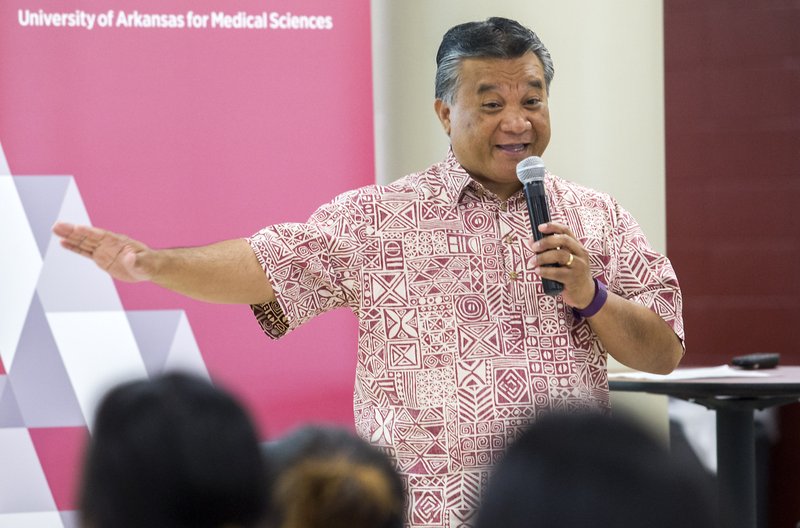Health care providers have created several programs to take care of the people from the Marshall Islands who have moved to Northwest Arkansas. The University of Arkansas for Medical Sciences Northwest in Fayetteville estimates from 10,000 to 14,000 Marshallese live in the region.
THREE WAYS TO HELP
Center for Pacific Islander Health
The Center for Pacific Islander Health is an early pioneer of research into and outcomes sharing about the Pacific Islander community, and is involved with other centers around the world, said Pearl McElfish, associate vice chancellor of the University of Arkansas for Medical Sciences Northwest. Last fall, center staff launched the Pacific Islander Health Research Network to disseminate results of studies and trials involving Native Hawaiians and Pacific Islanders to health care providers delivering care to those communities.
The Center and the Office of Community Health jointly hosted an international Pacific Islander health conference in Fayetteville in 2016, attended by more than 200 health care professionals, researchers, government officials and community leaders. In 2017, the center staff co-hosted the conference in Honolulu with the University of Hawaii.
“We’re quite excited to pass the conference management on to several of our collaborators who will be hosting it in the U.S. and the Pacific in coming years,” McElfish said.
Source: Staff report
The Office of Community Health and Research focuses on reducing health disparities through research and community programs, explained Pearl McElfish, the school's associate vice chancellor and director of many of the school's programs.
The Center for Pacific Islander Health, founded in 2015, is a research program designed to decrease health disparities and develop culturally sensitive approaches to education and treatment. The research extends to Pacific Islanders living in Oklahoma, Missouri and Kansas.
"Pacific Islanders are among the least studied ethnic group in the world, as they are typically grouped with Asian-Americans in terms of data," McElfish wrote in email.
The North Street Clinic treats uninsured diabetic Marshallese adults.
"The clinic sprang out of a need identified by students at UAMS who participated in health screenings conducted by the Office of Community Health and Research," McElfish said. "Students were identifying high numbers of Marshallese community members who were diabetic or pre-diabetic.
"Those who had insurance could visit with their physicians about treatment options. However, many did not have insurance and could not afford to pay for doctor's visits. The students worked with faculty at UAMS to launch the student-led, interprofessional free clinic for Marshallese with diabetes."
HEALTH CONCERNS
Since opening in 2014, the North Street Clinic has treated more than 600 Marshallese patients with diabetes, who were seen more than 2,500 times. UAMS faculty, staff and students from the colleges of medicine, pharmacy, nursing and health professions have been involved in screenings since 2013 and determined 38 percent of Marshallese have diabetes, compared with 9.3 percent of the general U.S. population.
Both health screenings and meetings with pastors and community leaders identified diabetes as a key health concern for this community, spurring UAMS to launch the clinic. Patients with severe, uncontrolled diabetes receive free care from UAMS endocrinologists who staff a monthly specialty clinic on site.
"The vast majority of these patients were not under a doctor's care prior to visiting UAMS and were already suffering from the effects of poor glucose management," McElfish said.
The local population also has high rates of obesity and hypertension, McElfish said.
"We're concerned about higher rates of cardiovascular disease, obesity and hypertension, and we look forward to advancing research in this area," she said.
Recent screenings of 272 Marshallese community members showed 28 percent were overweight and more than 60 percent were obese.
The North Street Clinic treats only Marshallese with diabetes without health insurance or another means to pay for treatment, McElfish said. To treat other needs, the medical school has partnered with area hospitals and other organizations to coordinate care.
The clinic staff works with the Arkansas Department of Health to provide vaccinations and tuberculosis screenings, as the disease is common in this population. And UAMS is able to refer clinic patients to other physicians for free well-woman care, vision treatment and low-cost cardiac care.
Other clinical programs -- such as family medical centers in Fayetteville and Springdale and an outpatient therapy clinic -- are open to all patients, McElfish said.
"Another challenge in the Pacific Islander community is the lack of diversity in health care providers," McElfish continued. "This is so important because providers who understand the culture and the language can better connect with and serve their patients, and the patients are more likely to follow through with doctor's orders."
UAMS Northwest boasts of Dr. Sheldon Riklon, one of only two Marshallese physicians in the world trained in the United States. Riklon is an associate professor in the school's College of Medicine's department of family and preventive medicine and is the inaugural holder of the Dr. Peter O. Kohler endowed distinguished professorship for health disparities.
Riklon oversees residents at the UAMS Family Medical Clinic and students at the North Street Clinic. He also treats patients at the Community Clinic in Springdale -- a partner organization, but a separate entity.
The medical school has trained 70 Marshallese community health workers and certified interpreters to bridge the gap between health care providers and the community. The trained community liaisons work with agencies and clinics throughout Northwest Arkansas.
"They have been an important part of educating the patients about management of their disease," McElfish said.
NW News on 03/04/2018

